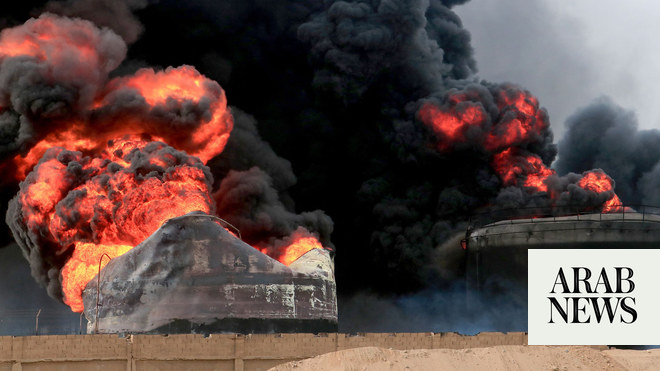BEIRUT: Israeli warplanes broke the sound barrier over Beirut, Sidon and other parts of Lebanon on Monday.
The planes carried out mock raids on the Hasbaya area and the occupied Shebaa farms, reaching the Bekaa.
Although hostilities on the southern front have significantly decreased, sporadic strikes continue.
One Israeli airstrike hit a house in the town of Chikhin in the Tire district.
The raid resulted in injuries and the Syrian Social Nationalist Party reported that one of its members was killed.
Meanwhile, a unit of the Lebanese army found the wreckage of the drone in the town of Aiha in the Rashaya district. The army command did not specify the nature of the drone and whether it was Israeli-made or from another source.
A Lebanese army watchtower was attacked by Israel on Sunday evening on the outskirts of the southern Lebanese city of Alma al-Shaab, leaving “two soldiers with moderate injuries who were transferred to a hospital for treatment,” according to the military.
Meanwhile, Hezbollah targeted an Israeli military facility in al-Maliki with a drone that hit one of its bunkers.
The events in the south of the country and the issue of extending the mandate of UNIFIL, which is on the agenda of the UN Security Council, were in the center of domestic political attention.
Interim Prime Minister Najib Mikati told a meeting with key officials that the latest developments “naturally call for caution, but we continue to discuss with the parties concerned and make the necessary diplomatic contacts to prevent any unwanted consequences from developing.”
He added: “We cannot say that there are assurances and guarantees, because no one can guarantee the intentions of the Israeli enemy. However, we are continuing our diligent efforts to resolve the situation.”
Regarding the extension of the mandate of the international force operating in southern Lebanon, Mikati said: “We are continuing diplomatic contacts to ensure a peaceful extension of the mandate of UNIFIL, whose essential role in the south we highly appreciate, along with fruitful cooperation between them and the army.
“From the contacts we made, we felt a desire to maintain that role, especially in the delicate circumstances the south is going through.”
Speaking after a meeting with Mikati, Foreign Minister Abdullah Bou Habib said he had informed the prime minister that “there is a quasi-agreement on the resumption of UNIFIL forces for one year under the same conditions and without any changes.”
Bou Habib, who briefed Mikati after returning from New York, also said US and European officials he met with stressed “the importance of not expanding the war and working to avoid an escalation of hostilities in the south.”
He added: “There is some optimism, or less pessimism, about the start of a full-scale war in Lebanon.”
Also on Monday, a group of opposition MPs filed a petition asking Parliament Speaker Nabih Berri to hold a session to discuss the ramifications of the ongoing conflict between Hezbollah and the Israeli military, now in its 10th month.
Opposition MPs – Georges Okais, Mark Dow, Ashraf Rifi and Salim Sayeh – demanded that Berry “hold a parliamentary session at the earliest opportunity to discuss the ongoing war, prevent its escalation and ensure that the government fulfills its constitutional responsibilities”.
In their petition, the parliamentarians called for diplomatic efforts to return to the 1949 ceasefire agreement and full implementation of UN Resolution 1701.
They stressed the need to end hostilities “outside the Lebanese state and its institutions, declare a state of emergency in the south of the country, hand over control to the army and allow it to respond to any attack on Lebanese territory. .”
They cited “escalation and threats that have reached their highest level since October 8, and growing fears of an extension to the ongoing war, which has cost us hundreds of Lebanese lives and thousands of destroyed homes so far, in addition to the economic and environmental damage caused by daily Israeli attacks, and the consequences of this in light of the political and economic crises afflicting the country, and the obstacles to the election of the country's president.”
Nabil Kauk, a member of Hezbollah's Central Council, said Israel had put the region “on a path of escalation.”
He said that “the support fronts in Lebanon, Iraq and Yemen have entered a new phase, introducing new equations of the field with which we hope to increase the pressure on the Israeli adversary to stop the aggression in the Gaza Strip.”
